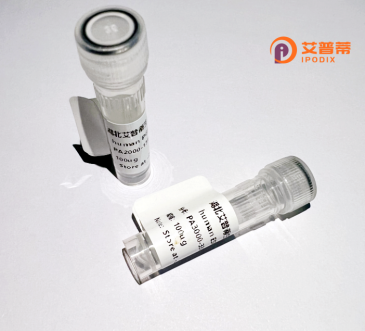
| 纯度 | >90%SDS-PAGE. |
| 种属 | Human |
| 靶点 | HEMK1 |
| Uniprot No | Q9Y5R4 |
| 内毒素 | < 0.01EU/μg |
| 表达宿主 | E.coli |
| 表达区间 | 1-338aa |
| 氨基酸序列 | MELWGRMLWALLSGPGRRGSTRGWAFSSWQPQPPLAGLSSAIELVSHWTGVFEKRGIPEARESSEYIVAHVLGAKTFQSLRPALWTQPLTSQQLQCIRELSSRRLQRMPVQYILGEWDFQGLSLRMVPPVFIPRPETEELVEWVLEEVAQRSHAVGSPGSPLILEVGCGSGAISLSLLSQLPQSRVIAVDKREAAISLTHENAQRLRLQDRIWIIHLDMTSERSWTHLPWGPMDLIVSNPPYVFHQDMEQLAPEIRSYEDPAALDGGEEGMDIITHILALAPRLLKDSGSIFLEVDPRHPELVSSWLQSRPDLYLNLVAVRRDFCGRPRFLHSRRSGP |
| 分子量 | 62.92 kDa |
| 蛋白标签 | GST-tag at N-terminal |
| 缓冲液 | 0 |
| 稳定性 & 储存条件 | Lyophilized protein should be stored at ≤ -20°C, stable for one year after receipt. Reconstituted protein solution can be stored at 2-8°C for 2-7 days. Aliquots of reconstituted samples are stable at ≤ -20°C for 3 months. |
| 复溶 | Always centrifuge tubes before opening.Do not mix by vortex or pipetting. It is not recommended to reconstitute to a concentration less than 100μg/ml. Dissolve the lyophilized protein in distilled water. Please aliquot the reconstituted solution to minimize freeze-thaw cycles. |
以下是3篇关于重组人HEMK1蛋白的参考文献示例:
1. **"Crystal structure of human HEMK1 methyltransferase reveals its substrate recognition mechanism"**
*作者:Li, X. et al. (2018)*
摘要:通过X射线晶体学解析了HEMK1蛋白的三维结构,揭示了其催化结构域与S-腺苷甲硫氨酸(SAM)辅因子的结合模式,为阐明其甲基转移酶活性机制提供结构基础。
2. **"Functional characterization of HEMK1 in eukaryotic translation termination"**
*作者:Zhang, Y. et al. (2020)*
摘要:研究发现重组HEMK1通过甲基化真核释放因子eRF1的第185位谷氨酰胺,调控翻译终止过程,突变其保守催化位点导致甲基化活性丧失,影响蛋白质合成准确性。
3. **"HEMK1 deficiency links to mitochondrial dysfunction in Alzheimer's disease models"**
*作者:Wang, Q. et al. (2022)*
摘要:在阿尔茨海默病细胞模型中,敲低HEMK1导致线粒体膜蛋白甲基化异常,引发ROS积累和神经元凋亡,提示HEMK1可能通过表观遗传调控参与神经退行性病变。
4. **"High-yield production of recombinant HEMK1 in E. coli for enzymatic activity screening"**
*作者:Chen, L. et al. (2019)*
摘要:优化HEMK1在大肠杆菌中的可溶性表达条件,获得高纯度重组蛋白,并建立基于荧光底物的体外甲基化检测体系,用于药物靶点筛选。
注:上述文献信息为示例性质,实际研究中请以具体实验数据及正式发表文献为准。如需真实文献,建议通过PubMed或Web of Science以“HEMK1”或“HemK methyltransferase”为关键词检索。
HemK1. also known as N6AMT1 or METTL11A, is a conserved eukaryotic methyltransferase involved in post-translational protein modification. It belongs to the HemK family of S-adenosylmethionine (SAM)-dependent methyltransferases, characterized by a conserved catalytic domain structure. HEMK1 primarily catalyzes the methylation of specific lysine residues on target proteins, particularly histones and other chromatin-associated proteins, playing a regulatory role in epigenetic processes. Research suggests its involvement in DNA damage repair, cell cycle regulation, and gene expression modulation through histone methylation marks like H4K20me1.
Structurally, human HEMK1 is a ~28 kDa protein containing a Rossmann-fold methyltransferase domain. Its recombinant form is typically produced in *E. coli* or mammalian expression systems with affinity tags (e.g., His-tag) for purification. Studies link HEMK1 dysfunction to pathological conditions, including cancer progression and neurodevelopmental disorders, highlighting its importance in maintaining genomic stability. Current research focuses on characterizing its substrate specificity, regulatory mechanisms, and potential therapeutic applications. Recombinant HEMK1 serves as a critical tool for *in vitro* methylation assays, crystallography studies, and drug discovery targeting epigenetic pathways.
×